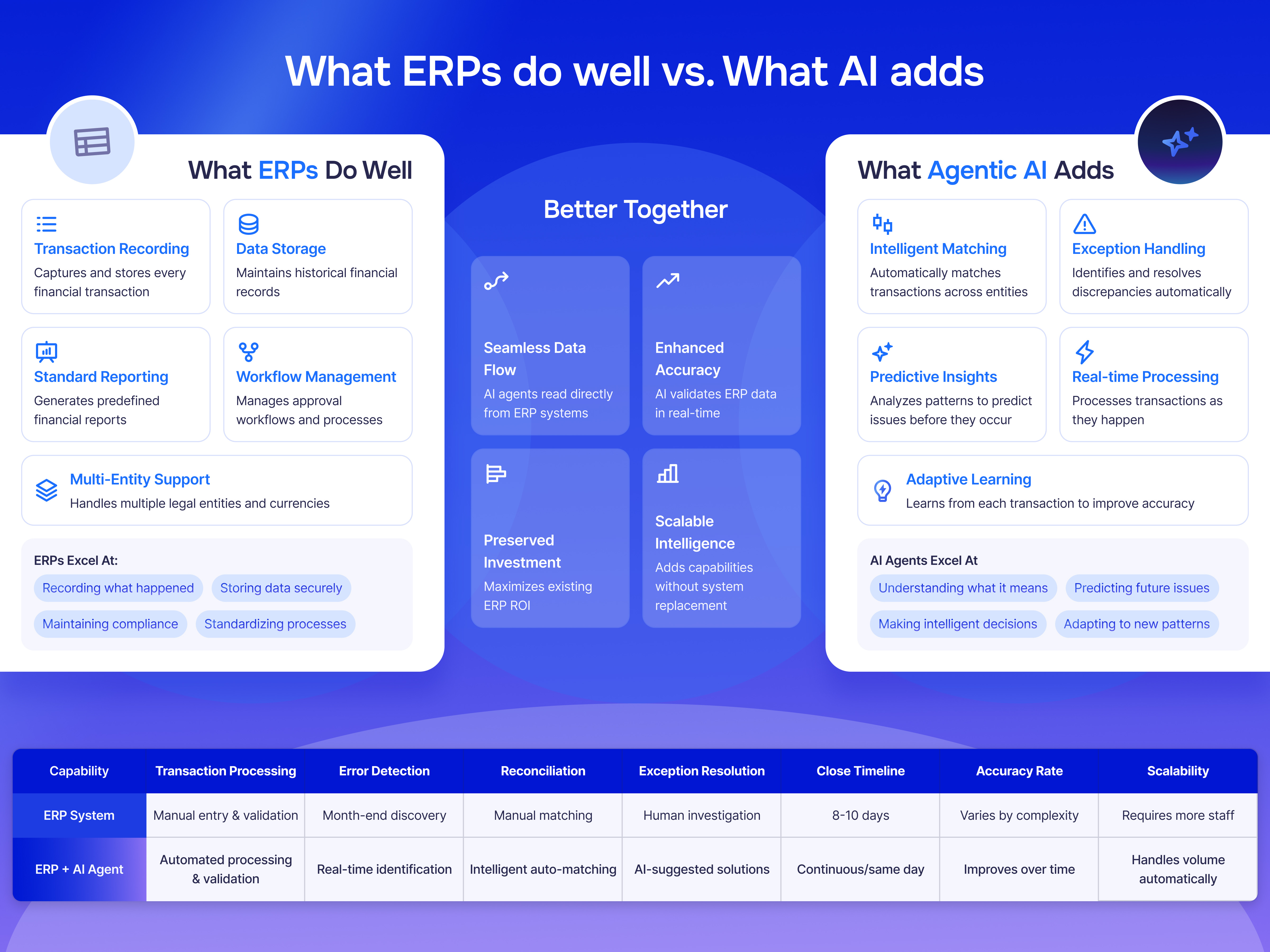
AI in ERP refers to the use of intelligent systems to automate financial workflows, interpret transactional data, and improve decision accuracy. It enhances core ERP functionality without replacement, helping finance teams streamline consolidation, forecasting, and audit readiness across multiple entities and ledgers.
Enterprise Resource Planning (ERP) systems have long been the backbone of operational finance. They’re reliable, structured, and essential for managing data across entities. But they weren’t built for speed, insight, or adaptability.
As finance teams face mounting complexity, global scale, and continuous pressure to close faster with fewer resources, many are turning to artificial intelligence to modernize their ERP stack without disrupting it.
This is where AI becomes not a replacement, but a powerful extension of your ERP. Rather than rip and replace, the smarter path is to layer intelligent automation across the systems you already have.
This means connecting fragmented modules, automating repetitive work, and generating insight from data that already exists inside your business.
Adopting AI within ERP environments is not about switching systems. It’s about extending the systems you already trust. When done right, it helps finance teams close the books faster, reduce manual work, and maintain full control over compliance and accuracy.
In this post, we’ll look at where AI fits in the ERP landscape, what it enables in practice, and how finance teams can prepare for what’s next.
Why AI in ERP Is Gaining Ground
ERPs are great at collecting and storing data. But when it comes to interpreting, acting on, or learning from that data, they fall short.
Most finance teams still rely on spreadsheets and manual processes to fill in the gaps, especially across entities, currencies, and reporting frameworks. That’s where AI fits in.
By integrating across ERP systems, AI can link previously disconnected data, identify anomalies before they become risks, and guide workflows based on real-time activity.
It transforms static systems into intelligent infrastructure, providing teams with visibility and control without the need for constant intervention.

What AI Does in an ERP Context
Modern finance workflows benefit from practical intelligence delivered through the following capabilities:
Intelligent task automation
Advanced automation handles time-consuming, rules-based work such as reconciliations, task routing, and period-end prep. This frees teams to focus on analysis and decision-making.
Predictive analytics for finance
AI models trained on historical and real-time data can forecast cash positions, identify trends, and detect exceptions automatically. This supports proactive planning and risk mitigation.
Embedded workflows across systems
Finance teams often operate across multiple ERPs or GLs. Artificial intelligence tools can route tasks efficiently, track status across entities, and ensure consistency in approvals and handoffs.
Real-time reporting and insights
Instead of relying on static reports, AI systems can generate dynamic narratives, dashboards, and alerts that reflect the current state of operations.
You might also like: How Finance Teams Use Trigger Agents
Can AI Replace ERP?
It’s a fair question, but the answer is no. ERP systems are still critical as the system of record.
What AI does is make those systems smarter and more useful by extending their value.
It connects the dots between disconnected modules, interprets data automatically, and adds intelligence where it’s most needed: close, consolidation, and reporting.
The Practical Impact for Finance Teams
Finance teams integrating AI into ERP environments typically see:
Faster, more accurate closes
AI reduces bottlenecks in the period-end process by automating reconciliations and surfacing exceptions in real-time.
Unified consolidation
Teams operating across ERPs, regions, or business units can align reporting faster by using AI to normalize and aggregate data.
Fewer spreadsheets and errors
By automating manual work, finance teams reduce the risk of inconsistencies and improve accuracy across reports.
Audit-ready documentation
AI captures process logs, generates narratives, and ensures that every action is traceable for compliance and audit reviews.
How AI in ERP Supports Scale
Scaling a finance function is more than just handling a greater volume of transactions. It requires maintaining control, consistency, and speed as organizational complexity increases.
Traditional ERPs, while essential for core records, were not designed to handle multi-entity workflows, rapidly growing data volumes, or global operations with agility.
AI helps bridge this gap by introducing dynamic layers of automation, intelligence, and visibility that scale with the business. Here’s how it enables scalable finance operations:
- Multi-entity operations: AI automates intercompany eliminations, reconciliations, and allocations across subsidiaries, so finance teams don’t need to manually intervene each time the structure grows.
- Cross-system workflows: As teams adopt multiple GLs or ERPs due to mergers or geographic expansion, AI links them without requiring central migration, enabling unified logic and reporting.
- Dynamic task management: It routes tasks based on workload, deadlines, and approvals across distributed teams, maintaining accountability without needing more people.
- Real-time exception handling: Artificial Intelligence continuously monitors transactions, flags issues, and prompts action, so volume doesn’t slow down responsiveness.
This type of scalability ensures finance can support business growth without creating operational bottlenecks or increasing risk exposure.
Explore more on this topic: Modern Accounting Tools: Excel vs RPA vs AI Agents Compared
What to Look for in an AI-Enhanced ERP Layer
Not all AI integrations are created equal. Many tools layer on intelligence without understanding finance workflows or audit expectations. When evaluating platforms that promise AI in ERP, finance leaders should prioritize:
ERP-native connectivity
The platform should connect directly with your general ledgers and subledgers, not force an extract-and-load pipeline.
Non-disruptive deployment
True scale comes from adoption. The AI layer should work with existing processes and controls, not require a rebuild.
Transparent logic
Finance automation must be explainable. Platforms should surface how decisions are made, where data flows, and what exceptions are flagged.
Purpose-built for finance
Avoid generic workflow tools. Look for platforms that understand reconciliations, close tasks, compliance checks, and reporting cycles by design.
Scalable automation starts with compatibility and clarity. The right AI-enhanced ERP layer won’t replace your system. It will make it faster, more accurate, and easier to extend across the business.
Looking Ahead: The Future of ERP with AI
AI isn’t a replacement for your ERP. It’s the connective layer that makes it work smarter by unifying fragmented data, automating critical workflows, and delivering insight when and where it’s needed.
For finance teams navigating global scale, multi-entity structures, and increasing compliance demands, this shift is essential.
Nominal makes that shift possible. We embed intelligent automation into the core of your financial operations, from reconciliation to consolidation to audit-ready reporting, without disrupting your ERP or requiring migration.
See how Nominal adds intelligence to your finance stack: book a demo today.
Curious how to modernize your ERP without replacing it? Join our free Smarter Finance with AI Masterclass and see how leading teams use AI to automate reconciliation, streamline consolidation, and scale finance operations: all while keeping their existing systems.





